

Early doubter of Rolling Stone rape story is vindicated. Anatomia de um falhanço jornalístico. «Rolling Stone» s'excuse après avoir publié une histoire de viol non vérifiée. Le magazine américain Rolling Stone s’est excusé lundi et a retiré de son site un article de novembre dernier qui avait relayé les accusations non vérfiées d’une jeune étudiante affirmant avoir été violée lors d’une fête sur un campus universitaire, un faux scoop qui avait secoué les Etats-Unis.
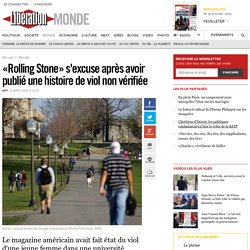
A sa place, le bimensuel a mis en ligne un rapport de la prestigieuse école de journalisme de l’université de Columbia qui pointe les erreurs pourtant «évitables» des reporters qui ont conduit à ce fiasco retentissant du magazine icône de la pop-culture. C’est «l’histoire d’un échec journalistique qui était évitable, un échec qui englobe le reportage, la relecture, la supervision éditorale et la vérification des faits», note ce rapport de 8 000 mots qui avait été commandé par le magazine, pourtant célèbre pour ses enquêtes détaillées. La police avait aussitôt ouvert une enquête.
UVA fraternity to sue Rolling Stone for 'reckless' and 'defamatory' rape story. The University of Virginia fraternity chapter at the center of Rolling Stone magazine’s retracted article A Rape on Campus said on Monday that it planned to sue the magazine for what it called “reckless” reporting that hurt its reputation.
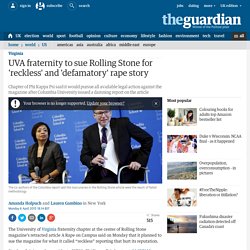
Stephen Scipione, the president of UVA’s Phi Kappa Psi chapter, told CNN Money that the fraternity – or all-male university society – is pursuing “all available legal action against the magazine”, a day after a team from the Columbia University graduate school of journalism concluded Rolling Stone failed to follow basic journalistic safeguards in publishing the story. In November 2014, the magazine published Sabrina Rubin Erdely’s article, which claimed there was a gang rape at the Phi Kappa Psi fraternity house. Soon after the article was published, and the school temporarily suspended all fraternities, questions were raised about the veracity of the article. Rolling Stone Cites Doubts on Its Story of University of Virginia Rape. Photo CHARLOTTESVILLE, Va. — An account of sexual assault in Rolling Stone magazine that shook the and horrified readers showed signs of crumbling on Friday as the magazine admitted to doubts about its report of a premeditated gang rape at a fraternity party and the fraternity issued its first rebuttal of some details.
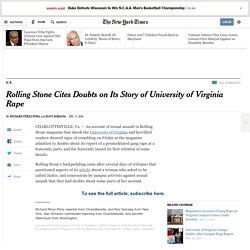
Rolling Stone’s backpedaling came after several days of critiques that questioned aspects of its article about a woman who asked to be called Jackie, and concessions by campus activists against sexual assault that they had doubts about some parts of her account. On Friday, the magazine published a note to readers from Will Dana, the managing editor, stating, “In the face of new information, there now appear to be discrepancies in Jackie’s account, and we have come to the conclusion that our trust in her was misplaced.” In an interview on Friday, Mr. Rolling Stone has not identified specific errors in the article beyond those that had been made public, he said. Emily J. Ms. Police Find No Evidence of Rape at University of Virginia Fraternity. Continue reading the main story Video CHARLOTTESVILLE, Va. — The police here said Monday that they had found no evidence that a woman was gang raped at a fraternity house in 2012 and that they were suspending their investigation, after a lengthy inquiry in which the accuser refused to cooperate.
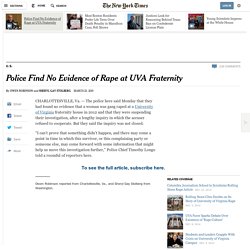
But they said the inquiry was not closed. “I can’t prove that something didn’t happen, and there may come a point in time in which this survivor, or this complaining party or someone else, may come forward with some information that might help us move this investigation further,” Police Chief Timothy Longo told a roomful of reporters here. “That doesn’t mean that something terrible did not happen to Jackie on the evening of Sept. 28, 2012,” Chief Longo said, referring to the accuser and adding that his department was simply unable to corroborate her account.
He added, “This case is not closed by any stretch of the imagination.” Photo. Sabrina Rubin Erdely, Writer of Rolling Stone Rape Article, Issues Statement. Sabrina Rubin Erdely, the author of a now-discredited article in Rolling Stone magazine about a rape at a fraternity, issued this statement: “The past few months, since my Rolling Stone article “A Rape on Campus” was first called into question, have been among the most painful of my life.
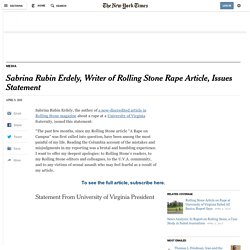
Reading the Columbia account of the mistakes and misjudgments in my reporting was a brutal and humbling experience. I want to offer my deepest apologies: to Rolling Stone’s readers, to my Rolling Stone editors and colleagues, to the U.V.A. community, and to any victims of sexual assault who may feel fearful as a result of my article. “Over my 20 years of working as an investigative journalist — including at Rolling Stone, a magazine I grew up loving and am honored to work for — I have often dealt with sensitive topics and sources.
In writing each of these stories I must weigh my compassion against my journalistic duty to find the truth. In Report on Rolling Stone, a Case Study in Failed Journalism. When Rolling Stone took the unusual step of bringing in Steve Coll, the Pulitzer Prize-winning dean of America’s most prestigious journalism school, to dissect its widely discredited article on campus rape, the magazine was clearly making a statement.
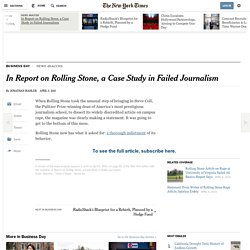
It was going to get to the bottom of this mess. Rolling Stone now has what it asked for: a thorough indictment of its behavior. The Columbia University Graduate School of Journalism report issued on Sunday makes plain in forensic detail what went wrong, how traditional safeguards broke down at pretty much every level of the editorial process. The tone is more constructive than chiding; it is a case study in the failure to follow best journalistic practices. Rolling Stone Article on Rape at University of Virginia Failed All Basics, Report Says. University of Virginia Fraternity to Go After Rolling Stone for Rape Article.
Photo.
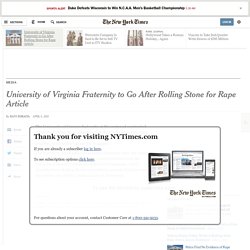
Rolling Stone isn’t firing anyone. That’s terrible for journalism. The Rolling Stone story in question.
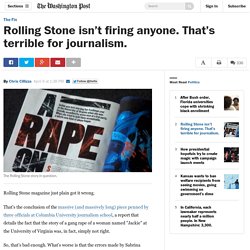
Rolling Stone magazine just plain got it wrong. That's the conclusion of the massive (and massively long) piece penned by three officials at Columbia University journalism school, a report that details the fact that the story of a gang rape of a woman named "Jackie" at the University of Virginia was, in fact, simply not right. So, that's bad enough. What's worse is that the errors made by Sabrina Rubin Erdely, the article's author, and the rest of the Rolling Stone editorial chain were entirely avoidable and encompassed the sort of basic reporting that every student in journalism school should know.
Here's the Columbia trio on what happened: What was the single point of failure at Rolling Stone? The authors of Columbia's investigative report answer that and more - Columbia Journalism Review. Columbia Journalism School Dean Steve Coll and Dean of Academic Affairs Sheila Coronel sat down for an interview with Columbia Journalism Review Editor Liz Spayd to discuss the school’s report on Rolling Stone’s story of a campus rape.

Sheila Coronel (left) and Steve Coll The report you produced for Rolling Stone magazine reads like a blunt condemnation of individual performances, sloppy newsroom practices and poor journalistic judgments made all along the way. Was there a single point of failure in the process that rises above the others? Steve Coll: Yes I think so. I think it’s the way they handled the three friends of Jackie (the alleged victim) who were present on the night she said she was attacked. Sheila Coronel: I think if you think of it in terms of the one avoidable and easily correctable error, that’s probably it. How Columbia Journalism School conducted this investigation - Columbia Journalism Review. Rolling Stone’s investigation: ‘A failure that was avoidable’ - Columbia Journalism Review.
Read: How the authors conducted this report Last July 8, Sabrina Rubin Erdely, a writer for Rolling Stone, telephoned Emily Renda, a rape survivor working on sexual assault issues as a staff member at the University of Virginia.

Erdely said she was searching for a single, emblematic college rape case that would show “what it’s like to be on campus now … where not only is rape so prevalent but also that there’s this pervasive culture of sexual harassment/rape culture,” according to Erdely’s notes of the conversation. Renda told Erdely that many assaults take place during parties where “the goal is to get everyone blackout drunk.” She continued, “There may be a much darker side of this” at some fraternities. “One girl I worked with closely alleged she was gang-raped in the fall, before rush, and the men who perpetrated it were young guys who were not yet members of the fraternity, and she remembers one of them saying to another … ‘C’mon man, don’t you want to be a brother?’” Key elements of Rolling Stone’s U-Va. gang rape allegations in doubt.
CHARLOTTESVILLE — A University of Virginia student’s harrowing description of a gang rape at a fraternity, detailed in a recent Rolling Stone article, began to unravel Friday as interviews revealed doubts about significant elements of the account. The fraternity issued a statement rebutting the story, and Rolling Stone apologized for a lapse in judgment and backed away from its article on the case.
Jackie, a U-Va. junior, said she was ambushed and raped by seven men at the Phi Kappa Psi house during a date party in 2012, allegations that tore through the campus and pushed the elite public school into the center of a national discussion about how universities handle sex-assault claims. Shocking for its gruesome details, the account described Jackie enduring three hours of successive rapes, an ordeal that left her blood-spattered and emotionally devastated.
(Related: U-Va. and sexual assault: The scrutiny will continue) “I never asked for this” attention, she said in an interview. U-Va. A Rape on Campus: A Brutal Assault and Struggle for Justice at UVA. Last month, Rolling Stone published a story entitled A Rape on Campus, which described a brutal gang rape of a woman named Jackie during a party at a University of Virginia fraternity house, the University's failure to respond to this alleged assault – and the school's troubling history of indifference to many other instances of alleged sexual assaults. The story generated worldwide headlines and much soul-searching at UVA. University president Teresa Sullivan promised a full investigation and also to examine the way the school investigates sexual assault allegations. Because of the sensitive nature of Jackie's story, we decided to honor her request not to contact the man who she claimed orchestrated the attack on her nor any of the men who she claimed participated in the attack for fear of retaliation against her.
In the months Sabrina Rubin Erdely reported the story, Jackie said or did nothing that made her, or Rolling Stone's editors and fact-checkers, question her credibility. S. Rolling Stone pede desculpa e retira artigo sobre violação. O director da revista norte-americana Rolling Stone admitiu que a publicação não cumpriu regras básicas de jornalismo numa reportagem sobre violação em grupo na Universidade da Virginia, publicada em Novembro do ano passado. Num extenso relatório independente, feito pela Faculdade de Jornalismo da Universidade de Columbia, os profissionais envolvidos no caso são acusados de terem investido a reputação da revista numa única fonte – a jovem que diz ter sido violada.
A credibilidade da reportagem intitulada "Uma violação no campus", assinada pela jornalista Sabrina Rubin Erdely, foi posta em causa poucos dias depois da sua publicação, mas o relatório pedido à Universidade de Columbia só foi revelado no domingo. Rolling Stone and UVA: The Columbia School of Journalism Report. A NOTE FROM THE EDITOR: Last November, we published a story, 'A Rape on Campus' [RS 1223], that centered around a University of Virginia student's horrifying account of her alleged gang rape at a campus fraternity house. Within days, commentators started to question the veracity of our narrative. Then, when The Washington Post uncovered details suggesting that the assault could not have taken place the way we described it, the truth of the story became a subject of national controversy.
As we asked ourselves how we could have gotten the story wrong, we decided the only responsible and credible thing to do was to ask someone from outside the magazine to investigate any lapses in reporting, editing and fact-checking behind the story. We reached out to Steve Coll, dean of the Columbia School of Journalism, and a Pulitzer Prize-winning reporter himself, who accepted our offer. This report was painful reading, to me personally and to all of us at Rolling Stone. Will Dana, Managing Editor 1.